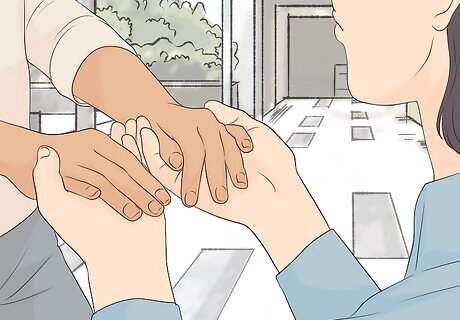
views
- In the moment when someone criticizes you, try not to take it personally. Resist the urge to argue and consider why they’re criticizing you instead.
- To address the situation, let the person know when they say something hurtful. Use “I” statements to tell them how you feel without blaming them.
- In the future, maintain a positive attitude to lead by example and do things that make you happy. If they won’t change, consider going your separate ways.
Coping with Criticism in the Moment

Try not to take the criticism personally. Instead, remind yourself that criticism is rarely actually about you. If a person is hyper-critical or negative, chances are they’d complain about anyone, whether or not there’s really something to complain about. So, try to calm yourself down and don’t let it get to you. Remind yourself that you’re worthwhile and talented, even if there’s a thread of validity to the criticism. There’s always room to improve yourself, but flaws and imperfections don’t define you. For example, your roommate might be right when they say you always forget to throw out empty milk containers. However, they're focusing on that flaw over your other qualities.

Consider their perspective before judging them. There are many reasons a critical person might be criticizing you. They might be unhappy themselves, with high expectations for their own achievements—or they might mean well but be overly blunt or direct. Figuring out where they’re coming from and their reasons for criticizing can help you understand what they’re really trying to say. Factors might include: Low self-esteem or insecurity. Your roommate, family member, romantic partner, or friend might be criticizing you to hide their feelings of inadequacy and make themselves seem strong instead. A sense of superiority. If they genuinely think they’re better than you at something, they might criticize your efforts to try and prove it. Anxiety. When they get anxious about something, they may try to manage it by lashing out with criticism, whether or not it’s warranted. Perfectionism. If they’re a perfectionist, they might have a hard time accepting mistakes or anything they deem “imperfect,” including another person’s shortcomings. A history of being criticized. If they’ve been criticized constantly before, especially when they were young, they might have naturally learned to be critical of themselves. Knowledge of the subject. Someone who knows a lot about something might be coming from a place of trying to educate you. They’re trying to be helpful, but their lack of tact might result in a misunderstanding. For example, if you’re a college student and your father (who didn’t go to college) berates you about your study habits, it might be because he’s insecure about his lack of education. In other words, it’s not personal.

Resist the urge to argue and use empathetic listening instead. When someone is being hyper-critical of you, they’re probably not trying to solve a conflict—they’re just complaining. So, arguing with them might just escalate the conflict rather than solve anything. Instead, try repeating what they said to show them you’re listening (and potentially help them see that their criticism was hurtful). For example, say something like, "So, I'm hearing you think it's unfair that I forgot to wash my dinner plate last night?" After repeating their words, react with empathy while calmly stating your own opinion. For example: “I'm sorry that was frustrating for you, but I honestly forgot. I'll just clean it up now and try to remember next time." If a person is very critical, they might continue to berate you past this point—but try not to egg them on. Simply restate your opinion, and eventually, they’ll likely get bored and back off.

Do your best to disengage and tune them out. Sometimes, the best means to deal with overly critical people is to ignore them. If someone is nitpicking or criticizing, end the conversation politely but firmly. Give them a quick, one-sentence acknowledgment (to show that you heard them), then carry on—and ignore them if they keep talking without taking the hint. For example, you could say, “Thanks, I’ll keep that in mind,” or “I’ll consider that,” to show that you’re ending the conversation. Sometimes, hyper-critical people thrive on conflict and drama. The more you respond, the more likely they'll be to criticize. If necessary, you could also respond with monosyllabic answers. When met with criticism, say something like, "Uh-huh," "Yeah," or "Okay,” while tuning them out.

Treat them with compassion. You might wonder why you should treat someone with compassion when they’re rude and inconsiderate toward you—but critical people often have a lot of negativity in their lives. As mentioned above, their criticism may come from a place of insecurity and unhappiness. The kinder you are to them, the more positively they’ll respond. Compassion can be as simple as smiling and saying hello when you see them or giving them a compliment out of the blue. They might not seem happy or positive at first—but give them time. As they get more comfortable with you (and your kindness), they’ll learn to respond in kind. A little kindness can be huge! Over time, your relationship may evolve into something much more fulfilling and supportive. However, if you’re continually kind to them and nothing changes, you certainly don’t have to keep pouring energy into the relationship. Be compassionate, but not to the point of draining yourself!

Take their advice on occasion. If you're living with an overly critical person, sometimes it's easier to let go of minor nitpicking and critiques. Even if someone is being unreasonably critical, there could be validity to their complaints. After all, everyone has bad habits, and you might be able to improve your relationship by taking their advice sometimes. For example, if your boyfriend wants you to fold the laundry in a particular style, it wouldn’t be a big deal to do things his way—and it’d ease up some of the tension. Say your roommate complains that you leave the bathroom floor wet after a shower. It might be annoying—but they’re right in thinking that someone could slip and fall. So, rather than getting annoyed or arguing, simply try to wipe up any water with a towel when you finish showering.
Addressing the Situation

Assert yourself. You don’t have to put up with criticism indefinitely. Criticism can reach a point where it's no longer tolerable. It’s one thing for your roommate to get on your case about taking the garbage out—but some critical people may begin giving unsolicited advice about your personal and professional life. In this case, it’s more than okay to assert yourself. Be firm, but also be kind. Try not to be aggressive or disrespectful, which can escalate the situation and lead to an argument instead of a resolution. State your concern in simple, concrete terms. For example, say your roommate is on your case about your relationship with your girlfriend. You could say, "I appreciate that you're concerned about how much time we spend together. It's nice to know you care about me, but I think my relationship is pretty stable. At the moment, I'm happy and don't need advice. If that changes in the future, I'll let you know."

Analyze the criticism and consider whether it’s valid or not. Try to objectively examine the criticism by first considering what’s being criticized. Is it something you can control? If so, you might consider making a change—but if not, the criticism may be unfair. Then, consider how the criticism is expressed. If they’re yelling or using foul language, the criticism is likely unreasonable. For example, if you tend to laugh loudly when watching funny movies, this is more of a personality trait than a conscious choice. In this case, the criticism may be unfair. It may also help to ask yourself whether your roommate has a genuine issue that they’d like you to address or if they just enjoy complaining.

Give them some honest feedback. One way to cope with highly critical people is to give them feedback. They may not understand how to be helpful without coming off as critical or condescending, even if they have valid advice. So, try telling them what does and doesn’t help you; over time, they’ll learn how to better communicate. For example, say your roommate is lecturing you excessively on how to mop the floor, but you already mopped that day, and you know you'll forget this advice the next time you mop. Say something like, "I understand you want me to change how I mop the floor. But next time, can you tell me before I start cleaning? I'm worried I'll forget by this time next week."

Use "I" statements. Negative and demanding people often upset those around them, and it’s okay to speak up when it happens. However, to prevent more conflict, use "I" statements to express your frustration. They highlight your feelings rather than assign blame, helping you express how something made you feel instead of passing objective judgment on the speaker. “I” statements have three parts. Start with "I feel" and state your feelings. After this, explain the behavior that led to this feeling. Finally, discuss why you feel this way. For example, say your boyfriend criticizes you for taking too long in the shower. Don’t say, "It's really irritating when you get on my case about my shower time. I don't bother you when you're in the bathroom. This is disrespectful." Even if you have a point, this may make him feel unfairly judged. Instead, rephrase your feelings. In the above scenario, you could say, "I feel disrespected when you lecture me about how long I shower because I feel like I always respect your privacy when you're in the bathroom."

Be open to compromise. Even if you feel you're in the right, living with someone means compromise. Look for ways you can meet an overly critical person halfway and try to let go of your own resentment. And, if there’s genuinely something you’re doing wrong, try to accept valid criticism. In those cases, make an effort to change to show your roommate, family member, or significant other that you care.
Moving Forward After Being Criticized

Be positive so you can lead by example. One of the best ways to deal with an overly critical person (especially when living with them) is to foster your own sense of positivity. Try not to let them make you feel negative. Show them how to be a happier, more positive person by simply being one yourself. If someone is criticizing everything you do, give them the opposite response. This helps show them they can’t drag others into their negativity. For example, if your girlfriend is berating you because she disagrees with your political beliefs, try saying, "Isn't it wonderful we live in a country where we're all entitled to our opinion?" Avoid placating a critical person by letting them continually go on and on. Instead, try saying, "I'm not sure what to tell you, but I'm sure you'll find the solution." Then, smile and back out of the conversation.

Look at their criticism as sincere and honest feedback. While criticism can hurt, it may help to change the way you look at it. Remind yourself that, at the very least, your critical roommate is also honest. You’ll always know they aren’t lying or beating around the bush; what you see is what you get. You can ask for their opinion and trust that you’ll get the truth. While you might not rely on this kind of person for support on a bad day, they might be a surprisingly great person to turn to when you need constructive criticism or feedback.

Steer clear of asking for their opinion if you can't handle it. Sometimes critical people offer unsolicited complaints, which isn’t your fault. However, you can at least limit the amount of criticism you get by avoiding asking for their opinion. If you don’t put yourself in a situation where they’re prompted to critique you, you may not be on the receiving end of their complaints so often.

Take care of your own happiness. When you're living with a negative person, it’s more important than ever to take responsibility for your happiness and make an effort to enjoy your life. Adopt a more positive outlook on life! It’s not always easy to be positive when you’re with someone so negative, but it may help to accept your circumstances and keep moving forward. Try to think to yourself, "It's difficult to live with this person, but that's life. I'm still me, and I can still enjoy myself!" Take time away if you need it. Spend a few hours each day outside the house by going out with your friends or even on your own. Surround yourself with positive, happy moments and people. This can help you maintain your happiness even while living with an overly critical person.

End the relationship or living situation, if necessary. When criticism is extreme and doesn’t stop, even after you respectfully confront them about it, you may have to question if your living situation (and relationship with them) is worth it. It’s hard to feel happy when every day brings an onslaught of criticism, so evaluate the relationship and consider whether it’s important enough to salvage. This applies to any kind of relationship—romantic, friendly, or familial. If you have a romantic partner who won’t stop criticizing you, it may be time to end the relationship. Similarly, you might consider going low-contact (or no-contact) with a family member who continually criticizes you or cutting off a friend who’s disrespectful and negative.



















Comments
0 comment